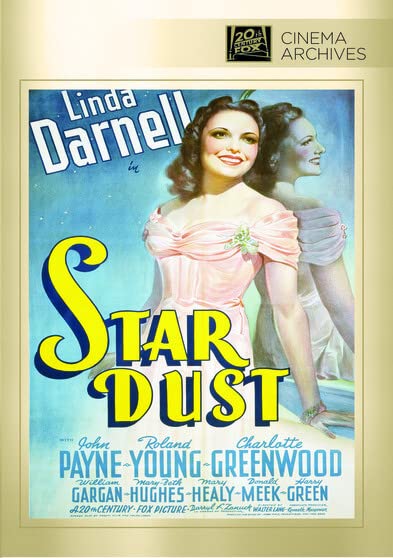
Making a film about the ups and downs of Hollywood is a pretty bold feat. Some have surpassed perfection: All About Eve (1950), Sunset Boulevard (1950), The Player (1992), Singin’ in the Rain (1952), and the criminally underrated masterpiece, The Stunt Man (1980). Others, such as Last Action Hero (1993), Delirious (1991), Full Frontal (2002), and Simone (2002), have totally missed the cut. As for Star Dust (1940), the third film starring the beautiful Linda Darnell, I would have to put in between. On one hand, it is a good comedy-drama about the accurate heartbreak of Hollywood, the other; the story can be considered basic and clichéd.
Darnell stars as Carolyn Sayres, a young girl from Arkansas who dreams of making it as a star, but is rejected for being too young. She falls for Bud Borden, another Hollywood hopeful who is also turned down. In an ironic twist of fate, her roommate, June Andrews, forgets a script left to her by producer Sam Wellman, which was written for her. So in order to be given another chance, Carolyn takes the script and the makes the lead part her own, but then when June and Sam find out what’s she done, they take matters in their own hands and inform the head of studio, Dane Warton. After the event, Carolyn and Thomas Brooke, the agent who was sent to look for young hopefuls in her hometown, are let go.
But just as all hope seems to be lost, Carolyn’s screen test ends up being shown in the Grauman’s Chinese Theater where it immediately becomes a hit. In a satisfying end, Carolyn becomes Hollywood’s latest Cinderella and eventually puts her hands and feet in cement near the Theater.
The supporting cast is actually pretty good: John Payne is refreshing and funny as Bud, Charlotte Greenwood is a riot as Lola Langdon, Roland Young provides strong support as Brooke, Jessie Ralph (who played Aunt Katherine in After the Thin Man) is great in a small role as Carolyn’s aunt, and Mary Beth Hughes provides a great rival for Carolyn as June.
Another irony is that the story is loosely based on Linda Darnell, who gives a warm and homely performance as Carolyn, our heroine. She was sixteen at the time of its release, and was told she was too old, but as time went on, her career did take off, co-starring in many films, such as Hangover Square (1945), Rise and Shine (1941), and two of her best films, A Letter to Three Wives (1949), directed by the great Joseph L. Mankiewicz, and No Way Out (1950), co-starring Sidney Poitier and Richard Widmark.
In 1965, while watching Star Dust, Darnell was killed when a fire broke out in the Chicago area where she was staying. She suffered multiple burns and extreme smoke inhalation, ending abruptly a very promising career of one the brightest stars in Hollywood.
The Fox Cinema Archives DVD is definitely nothing to get excited about. Although the 1.33:1 picture is pretty clear, and the Dolby Digital 5.1 sound is really good, there are no special features, not even a trailer, making Star Dust, an interesting, but tepidly unknown feature a hit-and-miss affair.